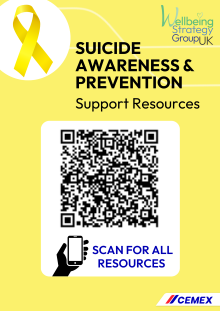Yesterday was World Suicide Prevention Day and in the UK many charities use the month of September to raise awareness around suicide and suicide prevention, sharing the message that suicide can be prevented.
According to a survey completed by the Samaritans with people who have lived experience of suicide, 60% said their suicidal thoughts had been interrupted by someone close to them, like a friend or family member.
If you’re worried someone is having harmful thoughts, it’s better to interrupt than not.
In this article we will share signposts to:
- Warning signs that someone may be at risk of suicide
- How to support someone you’re worried about
- Sources of support
Warning signs that someone may be at risk of suicide
A change in someone’s personality and behaviour might be a sign that they are having suicidal thoughts. You may be the best judge of when someone you know is behaving differently.
Changes can include:
- Becoming anxious
- Being more irritable
- Being more confrontational
- Becoming quiet
- Having mood swings
- Acting recklessly
- Sleeping too much or too little
- Not wanting to be around other people
- Avoiding contact with friends and family
- Having different problems with work or studies
- Saying negative things about themselves
There are some further indicators that suggest someone is more likely to attempt suicide:
- Threatening to hurt or kill themselves
- Talking or writing about death, dying or suicide
- Thanking you, or saying sorry to you for no apparent reason
- Preparing to end their life, such as storing up medication
- Putting affairs in order such as giving away belongings or making a will
Signs that something is wrong can sometimes be more difficult to spot. Such as a cheeriness which may seem fake to you. Or they may joke about their emotions, such as saying something quite alarming that is disguised as a joke. Don’t ignore your gut feeling if you are concerned about someone. Some people won’t be open about how they are feeling. If someone tells you about how they are feeling don’t ignore them.
How to support someone you’re worried about
If you’re worried someone is suicidal, it’s okay to ask them directly. Research shows that this helps – because it gives them permission to tell you how they feel and shows that they are not a burden.
Simple actions can help you be there for someone who is experiencing suicidal thoughts. Help them to get help. Reassure them that they were right to share with you and with the right support, these feelings can be managed. Encourage them to speak to their GP, you could help them plan what they will say and even offer to go with them. Make sure they know about helplines like Samaritans and Shout. Help them think of ways they can improve their sense of wellbeing.
People who have felt suicidal will often say what a huge relief it was to be able to talk about what they were experiencing. If someone does let you know that they are having suicidal thoughts, always take them seriously. You don’t have to be able to solve their problems. But, if you feel you can, offer support and encourage them to talk about how they’re feeling.
- How to interrupt someone’s suicidal thoughts – from people with lived experience of suicide https://www.samaritans.org/how-we-can-help/if-youre-worried-about-someone-else/how-to-interrupt-someones-suicidal-thoughts-guide/
- Poster: SHUSH listening Tips – Link >> https://media.samaritans.org/documents/listening-tips-poster.pdf
- Guide: Suicidal thoughts – How to support someone: https://www.rethink.org/Factsheets/9100/Suicidal%20thoughts%20-%20How%20to%20support%20someone%20factsheet [UK News download link]
- Video: Talking to someone about suicide https://youtu.be/OMf6sJKkst4
- Video: How being listened to can help https://youtu.be/qkeOvDribPU
- Video: Speaking to Family https://youtu.be/jDNUBnj2GXE
- What to say to someone who may be at risk of suicide – https://mentalhealth-uk.org/suicide/#section-7
- How to support someone you’re worried about: https://www.samaritans.org/how-we-can-help/if-youre-worried-about-someone-else/how-support-someone-youre-worried-about/
You can find all our resources on the UK News download page HERE – please print and share on your workplace screens, notice boards, and wellbeing boards.
